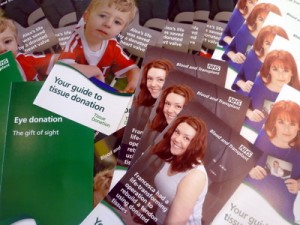
Human tissue donation was the featured topic at SI South Lancashire’s recent regional Programme Action Meeting. The speaker, Rebecca Denton (Tissue Donation Practitioner, North Tissue Retrieval Team, Liverpool NHS Blood and Transplant) gave the Soroptimists a comprehensive outline of this key element in healthcare.
As one of the 12-strong team based in Liverpool, Rebecca travels far and wide to take tissue. But which tissues are taken? Heart valves, corneas, skin, bone and tendons can all be used to help save lives or improve someone’s quality of life following illness or injury.
Most people are suitable for the donation of at least some tissue. Tissues can be taken up to 48 hours after death. From one tissue donation over 50 people could benefit. For example, a cornea donation could restore or greatly improve the sight of two people. Age is not necessarily a barrier – the oldest known donor of a cornea was 103.
Similarly skin donation has no age limit. Patients with 60/70% burns do not have enough of their own skin for grafting and need the gift of new skin.
Some tissue donations (heart valves and tendons) are age-limited owing to wear-and-tear. However, living donors can donate tissue such as bone that is no longer needed – after a hip replacement, for example.
NHS Blood and Transplant in Liverpool houses the largest retrieval and storage facility for human tissue in the UK. Tissue donors carry a card and are signed up to the register (as are full-organ donors): people can opt to donate to both. As families still have the right to override donors’ wishes the team liaises with family members before checking the medical history, and subsequently taking tissue.
Rebecca’s plea was to let family and friends know your wishes – take up the tissue issue and sign up to the donor register today!

